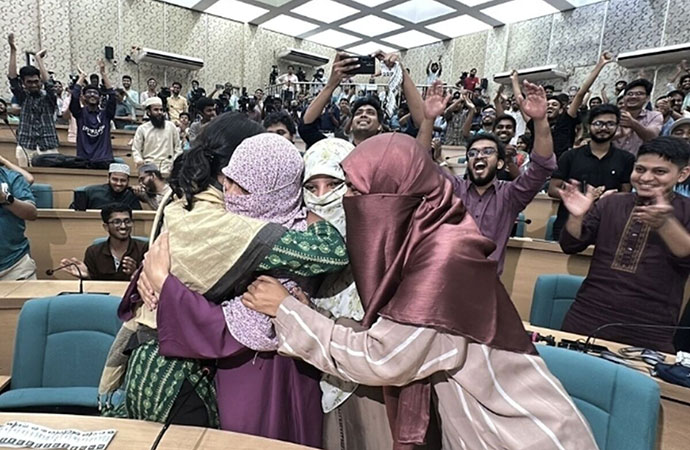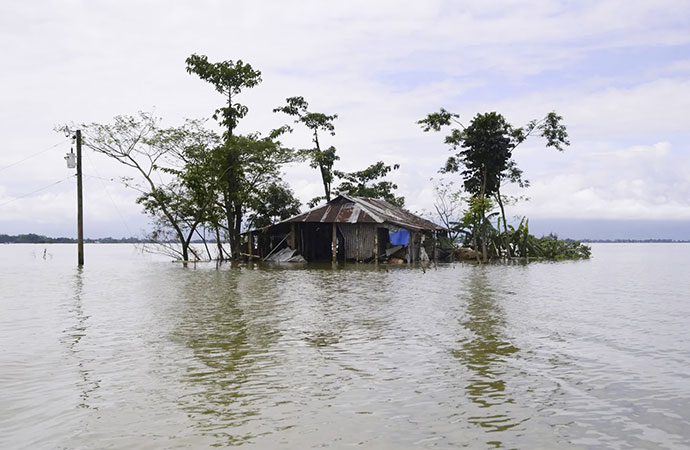Featured 1

One of the few constants of these last 13-and-a-half months has been the concerted attempt, in the form of a vile misinformation and disinformation campaign, to delegitimise last year's July Uprising as an extremist putsch, and impose a narrative of 'Islamist takeover'. Bangladesh, they even said, was going the way of "Afghanistan under the Taliban". Countless factchecks and debunkings have failed to deter these naysayers. But in the process their own credibility has been completely shot, at least among Bangladeshi audiences.
This week we have seen these same voices raised with renewed vigour, to greet the twin results of the DUCSU and JUCSU elections, that they claim to have vindicated their original concerns. The electoral landslides these elections witnessed in favour of the Jamaat e Islami student wing - Islami Chhatra Shibir - is the 'new evidence' they present, or purport to at least. As usual, they have cherrypicked the facts on the ground, and combined them with some blatant untruths to stitch together their preconceived narrative, that denies two of the most enlightened and progressive student bodies in the country their agency as voters. Would a truly democratic disposition ever deign to do that?
At the same time, it falls on us to not get defensive at such insinuations, and truly own the democracy we seek to build here by offering all the facts that are relevant. We ourselves have not shied away from describing the DUCSU result in particular, as nothing short of a political earthquake, due to Shibir's unprecedented show of strength and support. At the same time, we must also point out that these elections witnessed record participation rates for women, and a record number of them getting elected as well. Seven of the 28 posts up for grabs at DUCSU were won by women - four of them from Shibir's panel itself. This wasn't just an all-time high for DUCSU, or student parliaments in general.
A review of significant election results - parliamentary, local government, students' unions or any other body of note barring women-only institutions - from the 54-year history of Bangladesh reveals that women have never won such a high proportion of the seats - 25% - up for grabs at any other election. Not even close. That does not show up in the shockingly dumbed-down analyses we have seen accompanying the reportage on these elections, that clearly fail to live up to the hype that was created around them prior to voting.
Here is another uncomfortable fact for the naysayers: there wasn't a single incident of violence, not one, across either of the two elections. Again, this is unprecedented for student elections in Bangladesh, and made some of our own seasoned journalists unsure about how to cover the polling environment, where instead of 'muscle power', party thugs and cadres, caches of illegal firearms, reporters were met with a "Battle of Ideas".
That is why we must own these elections irrespective of the results, since they were the legitimate expression of the voters' choice - that much is indisputable. After 15 years of sham elections at almost every institution (from parliament to cricket board to professional bodies and even school management), that cannot be considered anything less than a win for Bangladesh post the Uprising. And we cannot let anyone tell us otherwise.

























Leave a Comment
Recent Posts
Religion and Politics: A Toxic ...
At Dhaka University, cafeteria workers have been told not to wear shor ...
Enayetullah Khan joins AsiaNet ...
AsiaNet’s annual board meeting and forum was held in Singapore, ...
In a New York minute
Many leaders back a UN call to address challenges to ..
Defaulted loans at Non-Bank Financial Institutions ( ..
How the late Zubeen Garg embodied cultural affinitie ..